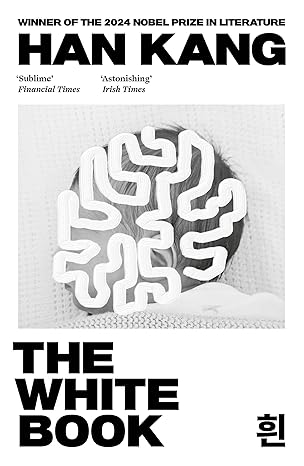Han Kang
White Book
White Book
Couldn't load pickup availability
Susan Midalia's Review
South Korean writer Han Kang first gained global recognition with her novel The Vegetarian, published in English in 2015. The winner of the International Booker Prize as well as a huge bestseller, The Vegetarian charts the life of a woman who, after choosing to stop eating meat, becomes alienated from her family. What happens next is both bizarre and confounding, requiring us to reflect on the human capacity for violence and the desire for absolute control over others. The novels that followed, all of them skilfully translated by Deborah Smith, received similar acclaim. Han Kang is also the most recent recipient of the Nobel Prize for Literature, and her most recent publication in English is The White Book (2017).
How to describe this unusual book? The White Book is quantitatively brief but emotionally resonant and philosophically profound. Its textual focus on the colour white is both virtuosic – there are 65 white objects referred to in the book, including swaddling bands, salt, rice, sugar cubes, bones, snow, pills, ice, hair, breast milk and fog - and a deeply felt meditation on grief, loss, and the fragility of life. And while the book is narrated as a series of short fragments rather than using a coherent plot, it keeps returning to a central experience in the narrator’s life: the death of her older sister, whose delicate white shawl becomes the shroud in which she was buried. The White Book memorialises not only the baby’s death but also the value of her two hours of life. It is also a lament for and an honouring of the narrator’s mother, who struggled alone to give birth when she was seven months’ pregnant. She is at one point described as “laughing whitely,” which in Korean means to laugh without meaning to: “laughter that is faint, cheerless, its cleanness easily shattered. And the face that forms it.” Here, the narrator/daughter pays tribute to her mother’s precarious and courageous ‘performance’ of happiness for the sake of her future children.
But The White Book offers so much more than the enduring pain of loss. It is also about language as a means of rebuilding the past. The concept of ‘rebuilding’ was literally evident to Han Kang when undertaking a writer’s residency in Warsaw, a city that was meticulously reconstructed after being destroyed during World War Two. What remained, however, and which caught Kang’s attention, was a single pillar: a concept which she uses in the book as a metaphor for her sister’s continued presence in her family’s history, and in her own memory. We are also asked to affirm the recuperative power of language; as the narrator describes it, she hopes that the process of writing The White Book “would be transformative, would itself transform, into something like white ointment applied to a swelling, like gauze laid over a wound.” If whiteness symbolises the anguish of a baby’s death, it also offers the possibility of healing.
Part poetry, part micro-fiction and part autobiography, The White Book is not what one of my friends would categorise as a “lying down book”: that is, one to read when reclining on a sofa or when lying on a towel at the beach. Rather, and to quote my friend again, it’s a “sitting up book”: one that will encourage you be alert to the complex layers of human experience, and to the possible meanings of death and life. It’s a beautifully written book to return to many times: to discover new and subtle connections between its seemingly disparate parts.
Available to order at the Lane.
Publisher's Review
From the author of The Vegetarian and Human Acts comes a book like no other. The White Book is a meditation on colour, beginning with a list of white things. It is a book about mourning, rebirth and the tenacity of the human spirit. It is a stunning investigation of the fragility, beauty and strangeness of life.
Translated from the Korean by Deborah Smith.
Share


